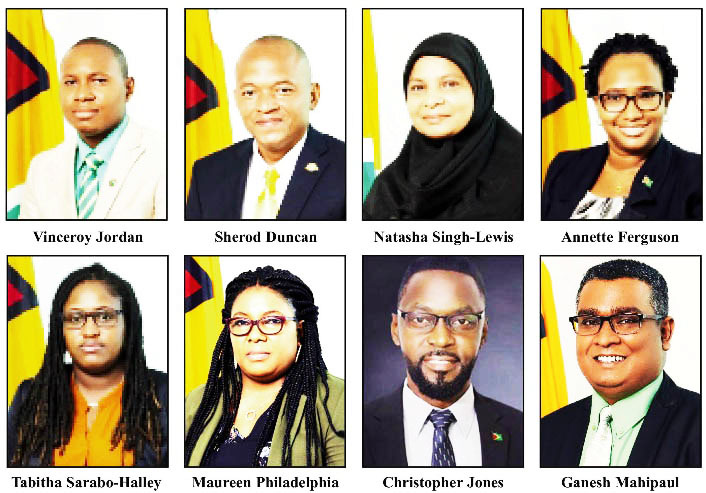Government, through Attorney General Anil Nandlall SC, is demanding payment of the just over $1 million in court costs yet to be made by the eight Opposition Members of Parliament (MPs) who lost the case challenging their suspension from the National Assembly.
On January 16th, Justice Damone Younge threw out the case, ruling that the court did not have the jurisdiction to intervene in the internal matters of the House. She ordered that they pay costs to the state in the sum of $1,050,000 no later than February 6th.
With that deadline having passed, the Attorney General in a letter dated March 10th to Senior Counsel Roysdale Forde, who represented the MPs, demanded that the payment be made no later than yesterday.
When contacted yesterday, Forde told this newspaper that the payment had not been made.
Nandlall indicated in his letter that failure to comply with the court’s order would result in enforcement without further notice.
Justice Younge had ordered the MPs to pay to the three respondents—the AG, House Speaker and Clerk—$350,000 costs each; warning that failure to comply could result in the applicants being held in contempt and possibly being liable to imprisonment or having assets confiscated.
The ruling came months after the eight MPs mounted a legal challenge against their suspension, in which they said that the principles of natural justice were breached as they were not given a hearing before the National Assembly’s Committee of Privileges.
The MPs were suspended from Parliament over their tumultuous bid on December 29th, 2021 to prevent the passage of the Natural Resource Fund (NRF) Bill, which saw the forcible removal of
the Parliamentary Mace. The Privileges Committee had recommended that Opposition Chief Whip Christopher Jones, Ganesh Mahipaul, Sherod Duncan and Natasha Singh-Lewis be suspended for four consecutive sittings and Annette Ferguson, Vinceroy Jordan, Tabitha Sarabo-Halley and Maureen Philadelphia be suspended for six consecutive sittings.
Justice Younge said in her ruling that the court formed the view that the National Assembly is vested with exclusive control over the management of its proceedings when it comes to internal operations.
“The National Assembly is empowered by the Constitution itself, to make its own rules for the conduct of its business and for the conferment of powers and privileges of its members,” she said.
She pointed out that the court agreed wholeheartedly with the proposition of the cases decided over the centuries that matters of such nature are not cognizable in the court except in the instances where there has been some violation of the provisions of the Constitution.
“The matters of which the applicants in this case complain arose out of internal proceedings of the House, which are not specifically provided for in the Constitution, and as such, fall within the category of being wholly internal proceedings of the National Assembly which this court ought not to interfere…” she had said in delivering her ruling.
Further, Justice Younge stated that the argument by the applicants citing a breach of their constitutional rights, was without merit since it stemmed from internal proceedings of the National Assembly and was not a justiciable inquiry.
The judge went on to emphasise that with applicants taking the oath of office they were aware of and subject to the rules and laws governing the House.
On July 28th last, the eight MPs received their letters of suspension from the National Assembly informing them that they would not be receiving their salaries and other benefits during that period.
On the chaotic night that led to their suspension, APNU+AFC parliamentarians were scattered throughout the parliamentary chamber chanting “no thieving bill must pass,” while blowing whistles and banging on the tables. The Speaker tried unsuccessfully to restore order to the House.
In the end, Ferguson grabbed the ceremonial mace and made a dash for the door but was tackled by the Sergeant-at-Arms and another parliamentary security officer. Other Opposition MPs rushed to her aid even as Singh was still on the floor making his presentation. Minister of Parliamentary Affairs and Governance Gail Teixeira later moved a motion to refer the eight MPs to the Committee of Privileges. The committee’s report, which recommended the
suspension, was tabled in Parliament on July 21st and adopted around 1:30 am on July 22nd after the APNU+AFC MPs left the chambers.
The suspended MPs were asking the court to declare that the report of the Committee of Privileges on the Privilege Motion was unconstitutional, null, void and of no legal effect. They were also asking the court to determine that the report breached the principles of natural justice since they were not guaranteed their rights prescribed under Article 144 (8) of the Constitution. In their application, they also unsuccessfully sought a notice seeking, among other things, an injunction staying their suspension.






